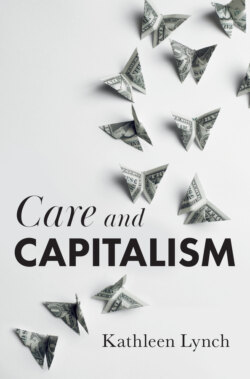Читать книгу Care and Capitalism - Kathleen Lynch - Страница 33
The role of ideas in legitimating subordination
ОглавлениеThe North Atlantic gender order has its roots in the European colonial period beginning in the later 1400s. Empire building was a highly gendered enterprise (Connell 1995). The domination, control, use and abuse of women were endemic to colonization, justified on the dubious philosophical and moral rationale that women were part of nature rather than society, especially if they were women of the colonized peoples (Patel and Moore 2018: 111–37).
While a commercial dividend was paramount in driving colonization and exploitation, including the exploitation of care work, the role that ideas played in both framing and legitimating the cheapening of things, including caring, was also crucial. Moral concepts and ideas were deployed that not only named the world but created it ontologically, implicitly prescribing as well as describing who and who was not fully human (Patel and Moore 2018: 47).
One of the sources of inspiration was the work of Descartes (1991). He drew a philosophical distinction between mind and body, between thinking things and extended things, res cogitans and res extensa. Not all humans were defined as thinking, including women and indigenous peoples, and non-humans, so-called extended things, or nature. Nature was subsequently defined as something to be possessed and used by humans; it was to be controlled and dominated by society (Patel and Moore 2018: 45–55). The two laws of capitalist ecology, one distinguishing between man (sic) and nature, and the other classifying nature as a thing to be dominated and controlled by man, provided moral justification for the exploitation of swathes of humanity and the destruction of much natural life.8
To justify making care cheap it had first to be defined as worthless, part of nature rather than society. This was achieved through the equation of care labour with femininity and women, people who were not fully human: as women were exploitable things, then by default their caring ‘nature’ was exploitable. Like water, trees and clean air, care was defined as freely available from the nature of women, regarded as being produced without effort or work. Within the binary Cartesian mind/body logic of value, as carers were part of nature, exploitable things, so caring was not an individuality-defining or citizenship-defining activity (Sevenhuijsen 1998; Hobson 2000).
